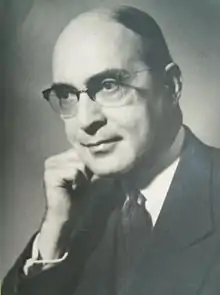Hossein Ghods-Nakhai
Hossein Ghods-Nakhaï (Persian: حسین قدس نخعی; GCVO 1894–1977) was an Iranian politician, cabinet minister, diplomat, and poet.[1]
 Hossein Ghods-Nakhai, as Iranian ambassador to Japan, c. 1956–58 | |
| Foreign Minister of Iran | |
| In office 1 December 1960 – 30 December 1960 | |
| Monarch | Mohammad-Reza Pahlavi |
| Prime Minister | Jafar Sharif-Emami |
| Preceded by | Jafar Sharif-Emami |
| Succeeded by | Abbas Aram |
| Personal details | |
| Born | 1894 Sari, Mazandaran, Iran |
| Died | 30 December 1977 Shiraz, Fars |
| Political party | Nationalist Party |
Early life
He was the son of the Iranian clerk, Hajj Agha Hasan Nakhai. His brother was Muhammad Nakhai, who served as the Secretary of Persian Legation in Brussels starting in 1928.[2] Like his father, Hossein's surname was initially Nakhaï. In his youth, he was the editor of a literature magazine, called Ghods, and so became known as "Mr. Ghods" to everyone. He then added the word Ghods to his surname. He was married to the daughter of the first Iranian ambassador to U.S., Sadr es-Saltaneh, also known as Haji Washington.
Diplomatic and political career
He held the position of the minister of foreign affairs between 1961 and 1963. Before that he was ambassador to Baghdad, London, Tokyo (October 1956 to January 1958), and to Washington, D.C. (in the 1960s, during John F. Kennedy administration). Afterwards, he was appointed as the minister of the royal court, a post he held until 1968. He was replaced as the minister of court by Amir Assadollah Alam. Afterwards, he became the ambassador to the Holy See (Vatican).
He was the chairman of the committee that negotiated with the USSR on return to Iranian gold deposited with the government of the Tsar.
Literary life
Nakhaï wrote extensive volumes of poetry (including his Rubaiyat), and prose (including "Trail lost in heaven"). Some of his works have been translated into English and other languages.
References
- Sharifi-Yazdi, Farzad (29 June 2015). Arab-Iranian Rivalry in the Persian Gulf: Territorial Disputes and the Balance of Power in the Middle East. Bloomsbury Publishing. p. 151. ISBN 978-0-85772-636-0.
- Burrell, Robert Michael; Jarman, Robert L. (1997). Iran Political Diaries, 1881-1965: 1943-1945. Archive Editions. p. 461. ISBN 978-1-85207-710-5.
- "حسين قدس نخعي". iichs.org. مؤسسه مطالعات تاريخ معاصر ايران.